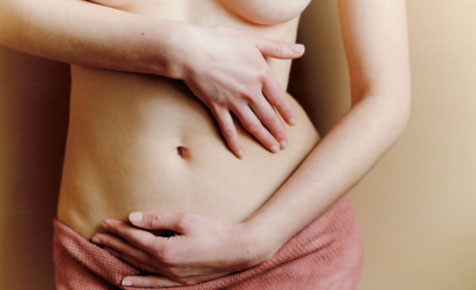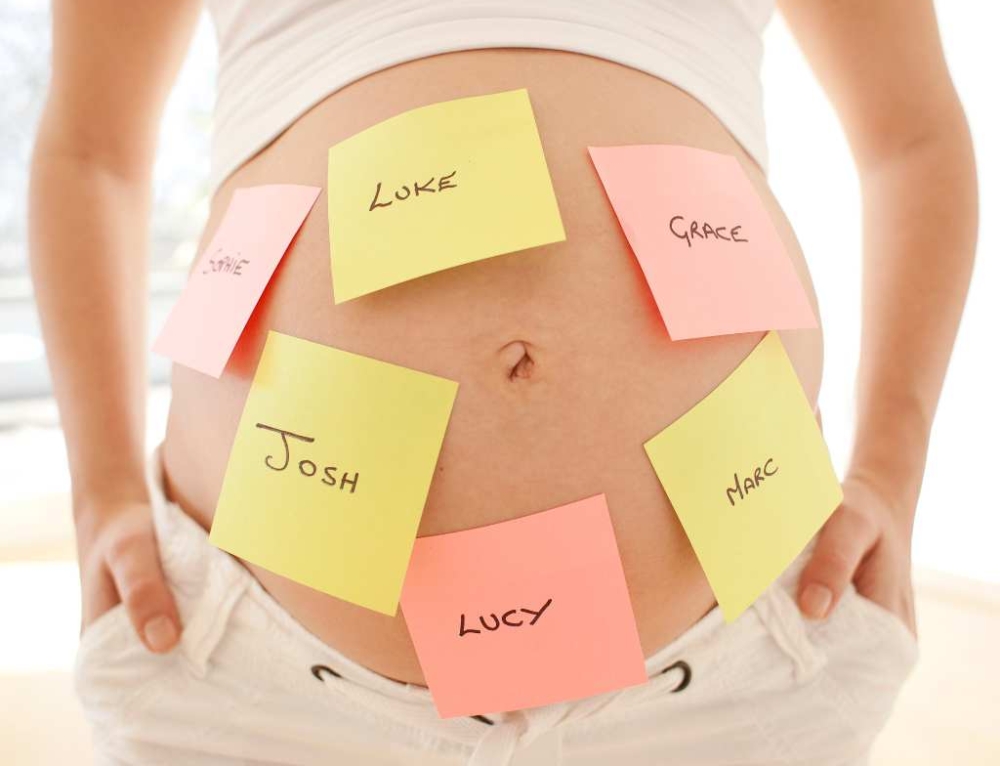Conception usually occurs about 2 weeks before your next period would have been due (or about two weeks after the start of your last normal period).
However, it takes about 6 days for your newly conceived baby to reach your uterus from your fallopian tube, and further 6 days for them to fully implant in the lining of your uterus, to start ‘interacting’ with your body. This ‘interaction’ involves your body providing your baby with nourishment through your blood stream, as well as your baby producing hormones that move into your body to support the pregnancy.
Once the baby fully implants, they start to release a hormone called human chorionic gonadotropin hormone (or HCG) into your blood stream. The HCG level starts off very low, but the concentration rapidly increases on the following days to produce physical pregnancy signs in the woman. (HCG levels also provide the basis for detecting a pregnancy with a pregnancy test.) This is the reason why early pregnancy signs do not start to become noticeable until around the time the woman’s next period would have been due (or 12 to 14 days after conception). In many cases, a woman will not notice any signs until 1 to 2 weeks after her period was due (or 5 to 6 weeks of the pregnancy), when the HCG level is sufficicently high enough to affect her body.
Note:
Women with twins, triplets or more may notice their pregnancy signs sooner or they may be more intense, because they have higher levels of HCG in their system. Also, other hormones increase during pregnancy as well, mainly progesterone and some oestrogen, which contribute to many of the early physical signs of pregnancy. These hormones are not tested for with pregnancy tests.
Progesterone rises pre-menstrually, but continues to rise further after the period is missed. This is why pre-menstrual feelings can be confused with early pregnancy signs. Most women don’t get pregnancy signs until after their period is missed and the hormones increase to levels that their body is not used to. However, a few women do get pregnancy signs earlier, especially if they have had a baby before, because their body is more sensitive to the hormones and they know they ‘feel different’ than just pre-menstrual.
By about 6 weeks after the last normal period, the amount of blood flowing around a woman’s newly pregnant body increases by up to 50%. Blood flow to her skin increases, making her feel warmer, often sweating more (particularly in her hands and feet). Her metabolism also increases by about 20%, creating more body heat. A pregnant woman’s temperature will often rise to about 37.8oCelsius (or about 100.4oFahrenheit), when it is normally 37oCelsius (or 98.6oFahrenheit) when not pregnant. Extra blood flow in the woman’s skin can also contribute to nose bleeds and bleeding gums.
The following is a general overview of some more common physical changes that you may experience during the first 12 weeks of your pregnancy. They can include:
- No periods or lighter bleeding
- Breast and nipple changes
- Passing urine changes
- Passing urine more frequently
- Bloating, cramps and backache
- ‘Morning sickness’
- Increased saliva
- Dizziness and fainting
- Tiredness
- Headaches
- Constipation and wind
- Libido
No periods or lighter bleeding
The most obvious sign that lets a woman know (or suspect) she is pregnant is missing her menstrual period. However, not all women experience ‘no bleeding at all’, and this can confuse them about whether they are pregnant, or if their pregnancy will continue.
A few women will experience what is called an ‘implantation bleed’.
This is where a light bleed occurs as the growing baby burrows into the lining of their mother’s uterus (usually about 12 days after the egg has been fertilised, or ‘conceived’). An implantation bleed will typically occur just before (or around the time) the next period would have been due. However, it is usually not as heavy, or as long as a normal period. Caregivers will usually try and find out if a woman’s last ‘period’ was normal, to avoid calculating the baby’s due date from an implantation bleed, which would miscalculate the baby’s actual due date at about 3 to 4 weeks later.
Occasionally, a woman will continue to have a small, red or pinkish vaginal loss for a day or so around the time that their period would have been due (for example at around 4, 8, 12 and 16 weeks of the pregnancy). This is more common during early pregnancy, but can persist into later pregnancy as well.
Some women will experience bright spotting (fresh bleeding), or brown spotting (bleeding that happened a day or so ago), at some stage during their pregnancy. This may appear as a heavy bleed (like a period), a ‘light period’, or as something that she notices when wiping herself after going to the toilet. About 50% of women who experience bleeding during the first 12 weeks of their pregnancy will continue to experience a normal pregnancy. However, up to 50% of women will experience a miscarriage at some point after the bleeding starts. Early pregnancy bleeding is usually investigated by an ultrasound.
Note: Any bleeding during pregnancy should be communicated to your caregiver.
Other causes of bleeding are discussed in depth in bleeding during pregnancy.
Breast and nipple changes
When girls reach puberty, their breasts develop and enlarge under the influence of the hormone oestrogen. When a woman becomes pregnant, her breasts start to undergo further changes from about 4 to 6 weeks after her last normal period (or about 2 to 4 weeks after conception).
This is due to the milk ducts growing and maturing, in preparation for breastfeeding, as well as an increased blood supply, making the veins in the breasts become more noticeable. Some women experience breast changes as a ‘pre-menstrual’ sign, and therefore may sense changes even before their period is due.
The breasts will often feel tender, swollen and/or much ‘fuller’. Some women also experience tingling sensations. By about 12 weeks of the pregnancy, the skin of the nipple and areola may start to darken or ‘pigment’. Skin colour changes are very individual to each woman. However, women with darker hair and darker complexions tend to notice more colour change than fairer skinned, blonde or redheaded women. The nipples may become more prominent and feel quite sensitive (or even sore). You may wish to start wearing a good fitting bra (such as a sports bra without under wires) to support your changing breasts.
Passing urine more frequently
Many women will complain of needing to pass more urine during early pregnancy. This is mainly because the blood flow to the woman’s kidneys increases by up to 35 to 60%. The extra blood flow makes her kidneys produce up to 25% more urine soon after conception. This increased urine production peaks by about 9 to 16 weeks of the pregnancy, then settles.
Passing urine frequently can also be influenced (to a lesser degree) by pressure on the woman’s bladder from her growing uterus. Pressure on the bladder is the main reason why women pass urine frequently in the last 3 months of pregnancy, as the baby grows heavier, and moves further down into the woman’s pelvis in the weeks just before the birth.
Bloating, cramps and backache
Many women experience bloating, mild cramping and slight backache as pre-menstrual physical signs or symptoms. As the uterus grows, these sensations may also be associated with early pregnancy.
Many women worry when they feel mild cramping, tugging and pulling in the early weeks. Some women find tissue salts such as Mag Phos helps with cramping. If there is no bleeding associated with it, then it is probably normal.
Note: If you have strong or severe cramping or pain, you should contact your local doctor (or pregnancy caregiver) for guidance and advice.
Morning sickness
Morning sickness or ‘all day and all night sickness’, can involve feeling nauseated, and/or vomiting. It is one of the most common physical complaints of early pregnancy and is due to your body’s reaction to the high levels of pregnancy hormones in the body. Many women find that certain smells (or even pushing the toothbrush too far down the back of your throat) can cause them to be overwhelmed with nausea (or vomit). You can read more about morning sickness remedies that work here.
Increased saliva
Many women notice they produce more saliva. The medical term for this is ‘ptyalism’ (pronounced ‘tie-al-ism’). Ptyalism can happen on its own but it is usually associated with nausea and vomiting (morning sickness) during early pregnancy. Some remedies for morning sickness may help with the ‘drooling’, like eating dry, plain cracker biscuits and having small regular meals. Ptyalism will usually subside when the nausea improves (usually by 12 to 14 weeks of the pregnancy). A homoeopath may prescribe ‘mercurius solubilis’ or ‘veratrum album’ to help with it. Check with your practitioner.
Dizziness and fainting
In the Victorian era, fainting was an unsophisticated way of recognising if a woman was pregnant. Amazingly enough, this physical sign was probably not far from being accurate. Fainting during early and middle pregnancy is a very common experience. It happens because the woman’s blood vessels naturally relax and dilate under the influence of the hormone progesterone, lowering her blood pressure.
Fainting is not usually a problem, just a little embarrassing if you do it in public! You can read about dealing with fainting in dizziness and fainting.
Tiredness
It is normal for a woman to feel tired at different stages of her pregnancy. However, some women will feel extremely fatigued during the first 12 weeks or so. This can feel ‘never ending’ and unrelenting, and in many cases very frustrating, especially if you can’t find the energy to do everything you want to do. It is not unusual to have 10 or 12 hours sleep, only to get up and still feel lethargic and tired. As your body adjusts to the enormous metabolic changes that are necessary to grow your baby, the tiredness and fatigue usually subside (around 12 to 14 weeks of pregnancy), bringing renewed energy and vigour.
In some cases, the tiredness may be due to (or made worse by) lifestyle factors. For example, if this is not your first pregnancy, you may feel continually exhausted because you are looking after another child(ren). It is important to rest whenever possible and listen to your body when you feel you need to slow down. If possible, take a rest and lie down for a while before dinner and/or have early nights. On weekends have a sleep, or put your feet up during the day. If you can, ask family or friends to take your child/ren for a couple of hours (or perhaps overnight occasionally) so you can rest and ‘sleep in’ the next morning.
Headaches
Some women experience headaches during the first 12 weeks of their pregnancy. Frequent headaches may be caused by hormonal changes, but they may also be due to the normal increase in blood volume circulating in the woman’s system during pregnancy. Adjusting to a new pregnancy can also be a stressful time for many women. Therefore, headaches caused by tension may also be experienced. Occasionally, a woman who is prone to headaches or migraines can find she does not experience them as often during pregnancy.However, others may find they are worse. You can read more on this in headaches during pregnancy.
Constipation and wind
Constipation (or having difficulty in opening the bowels or ‘passing motions’), is a common complaint, usually happening during the first (and/or last) 3 months of the pregnancy. Constipation is thought to happen because the hormone progesterone slows the movement (or ‘motility’) of the gut. The longer food stays in the intestines, the more water is reabsorbed from the bowel motions back into the body, making them harder to pass. As a first line of action, the best way to deal with constipation is to adjust your diet by increasing the fibre in your foods (whole grains) and water intake and to include fresh fruit and vegetables (and often dried fruits and fruit juices). However, some women feel they need additional remedies to deal with it. You can read more in constipation during pregnancy.
Also, the bowel can also be affected by making you produce more gas and wind during pregnancy. This can make some women feel mild to strong wind pains occasionally. Peppermint tea or peppermint water can help with this.
Libido
A woman’s sexuality and libido often change during early pregnancy, either in a positive or a negative sense. For some women, sex becomes a celebration of their pregnancy and brings with it a sense of ‘freedom’, because contraception is no longer a concern. Extra blood flow to the breasts and genitals can increase sensitivity, sexual arousal and the desire for sex. However, other women find that the first 12-14 weeks of pregnancy brings with it continual tiredness, nausea and/or vomiting, making sex the furthest thing from their mind. You may wish to read more in sex during early pregnancy.







Leave A Comment
You must be logged in to post a comment.